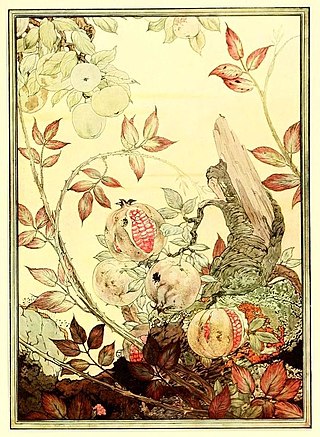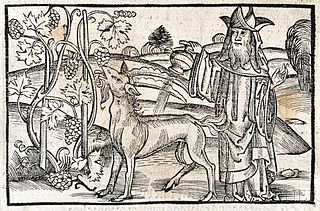
Aesop's Fables, or the Aesopica, is a collection of fables credited to Aesop, a slave and storyteller who lived in ancient Greece between 620 and 564 BCE. Of varied and unclear origins, the stories associated with his name have descended to modern times through a number of sources and continue to be reinterpreted in different verbal registers and in popular as well as artistic media.
A wolf in sheep's clothing is an idiom from Jesus's Sermon on the Mount as narrated in the Gospel of Matthew. It warns against individuals who play a duplicitous role. The gospel regards such individuals as dangerous.

"The pot calling the kettle black" is a proverbial idiom that may be of Spanish origin, of which English versions began to appear in the first half of the 17th century. It means a situation in which somebody accuses someone else of a fault which the accuser shares, and therefore is an example of psychological projection, or hypocrisy. Use of the expression to discredit or deflect a claim of wrongdoing by attacking the originator of the claim for their own similar behaviour is the tu quoque logical fallacy.

The Farmer and the Stork is one of Aesop's Fables which appears in Greek in the collections of both Babrius and Aphthonius and has differed little in the telling over the centuries. The story relates how a farmer plants traps in his field to catch the cranes and geese that are stealing the seeds he has sown. When he checks the traps, he finds among the other birds a stork, who pleads to be spared because it is harmless and has taken no part in the theft. The farmer replies that since it has been caught in the company of thieves, it must suffer the same fate. The moral of the story, which is announced beforehand in the oldest texts, is that associating with bad companions will lead to bad consequences.

Zeus and the Tortoise appears among Aesop's Fables and explains how the tortoise got her shell. It is numbered 106 in the Perry Index. From it derives the proverbial sentiment that 'There's no place like home'.

The Fox and the Sick Lion is one of Aesop's Fables, well known from Classical times and numbered 142 in the Perry Index. There is also an Indian analogue. Interpretations of the story's meaning have differed widely in the course of two and a half millennia.
The phrase out of the frying pan into the fire is used to describe the situation of moving or getting from a bad or difficult situation to a worse one, often as the result of trying to escape from the bad or difficult one. It was the subject of a 15th-century fable that eventually entered the Aesopic canon.
The Hawk and the Nightingale is one of the earliest fables recorded in Greek and there have been many variations on the story since Classical times. The original version is numbered 4 in the Perry Index and the later Aesop version, sometimes going under the title "The Hawk, the Nightingale and the Birdcatcher", is numbered 567. The stories began as a reflection on the arbitrary use of power and eventually shifted to being a lesson in the wise use of resources.

The Trees and the Bramble is a composite title which covers a number of fables of similar tendency, ultimately deriving from a Western Asian literary tradition of debate poems between two contenders. Other related plant fables include The Oak and the Reed and The Fir and the Bramble.
The Gourd and the Palm-tree is a rare fable of West Asian origin that was first recorded in Europe in the Middle Ages. In the Renaissance a variant appeared in which a pine took the palm-tree's place and the story was occasionally counted as one of Aesop's Fables.
The Crow or Raven and the Snake or Serpent is one of Aesop's Fables and numbered 128 in the Perry Index. Alternative Greek versions exist and two of these were adopted during the European Renaissance. The fable is not to be confused with the story of this title in the Panchatantra, which is completely different.

The Goat and the Vine is counted as one of Aesop's Fables and is numbered 374 in the Perry Index. There is also a West Asian variant.

The Dog and the Wolf is one of Aesop's Fables, numbered 346 in the Perry Index. It has been popular since antiquity as an object lesson of how freedom should not be exchanged for comfort or financial gain. An alternative fable with the same moral concerning different animals is less well known.

The Fox and the Weasel is a title used to cover a complex of fables in which a number of other animals figure in a story with the same basic situation involving the unfortunate effects of greed. Of Greek origin, it is counted as one of Aesop's Fables and is numbered 24 in the Perry Index.

The Ass and his Masters is a fable that has also gone by the alternative titles The ass and the gardener and Jupiter and the ass. Included among Aesop's Fables, it is numbered 179 in the Perry Index.
The Fowler and the Snake is a story of Greek origin that demonstrates the fate of predators. It was counted as one of Aesop's Fables and is numbered 115 in the Perry Index.

The Dove and the Ant is a story about the reward of compassionate behaviour. Included among Aesop's Fables, it is numbered 235 in the Perry Index.

The Ape and the Fox is a fable credited to Aesop and is numbered 81 in the Perry Index. However, the story goes back before Aesop's time and an alternative variant may even be of Asian origin.

The classical legend that the swan sings at death was incorporated into one of Aesop's Fables, numbered 399 in the Perry Index. The fable also introduces the proverbial antithesis between the swan and the goose that gave rise to such sayings as ‘Every man thinks his own geese are swans’, in reference to blind partiality, and 'All his swans are turned to geese', referring to a reverse of fortune.
The fuller and the charcoal burner is one of Aesop's Fables and numbered 29 in the Perry Index.














